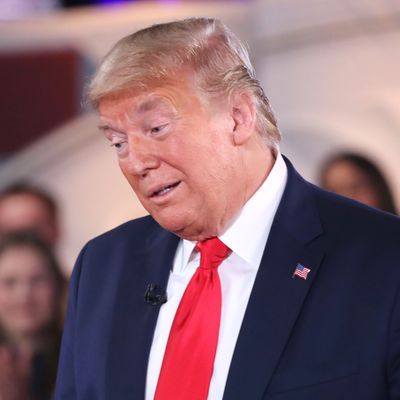
Last night, President Trump made an attempt to reassure the public on the state of the economy. It was not very reassuring. His answer implied that, however low your assessment of his grasp of the economy beforehand — and mine was already extremely low — the president knows even less than anybody thought possible.
Here is Trump’s answer:
Well, look, we were set to hit 30,000 on the Dow. This is a number that nobody even came close to. And already we have the number. And even though it’s down 10 or 11 percent, it’s still the highest it’s ever been, by far. It certainly might have an impact. At the same time, I have to say, people are now staying in the United States, spending their money in the U.S. — and I like that. People are now staying in the United States, spending their money in the U.S., and I like that. I’ve been after that for a long time.
This string of sentences is like an onion of stupidity, and peeling back each layer revealed even more stupidity lying beneath. Let’s go through it step-by-step.
“Well, look, we were set to hit 30,000 on the Dow.”
The answer begins veering off course immediately. The prompt for his answer was “the state of the economy.” Trump replies by citing the Dow Jones Industrial Average. Of course, the stock market is not the same thing as the economy, and the Dow Jones Industrial Average is not even the same thing as the stock market. (It is the oldest measure of stock performance, but not the best.)
“This is a number that nobody even came close to.”
The Dow has been rising for decades. Every president sees the stock market hit a new high. For whatever it’s worth, which is not much, the rate of growth under Trump is much lower than it was under his predecessor:
“And already we have the number. And even though it’s down 10 or 11 percent, it’s still the highest it’s ever been, by far.”
It might be helpful that stocks are way up if your primary concern is the level of your investment portfolio. But most Americans do not get their primary source of income from stocks. The concern about the Dow being down 10 percent is what it indicates about the future of the economy. Stocks have fallen because investors are concerned about a recession. Trump seems unable to comprehend the problem from any perspective other than that of people who are living off their stores of wealth.
“It certainly might have an impact.”
It is not clear what “it” refers to (the virus? The drop in the Dow?) or what impact he is describing (the economy? The market? His reelection?).
“At the same time, I have to say, people are now staying in the United States, spending their money in the U.S. — and I like that. People are now staying in the United States, spending their money in the U.S., and I like that. I’ve been after that for a long time.”
Here is where the answer goes truly off the rails. Trump’s mental model here is that America loses money when Americans travel overseas. Forcing them to stay here means they stop spending money at the Eiffel Tower and start spending it on Disneyland (or perhaps one of the many fine luxury properties operated by the Trump Organization).
One problem is that tourism works two ways. Americans spend money overseas, but people also come here. In fact the United States draws more spending from tourists coming here than it spends on sending tourists overseas. So just on its own, shutting down international travel is not going to “make” money for the U.S. economy, it will cost money.
Even if Trump’s imaginary forced-domestic-tourism plan somehow could create a benefit, the coronavirus has created all kinds of other, highly negative countervailing forces. Trump wants to limit international trade, but the economy nonetheless depends on supply chains that require travel between countries. Also, even domestic travel is being limited, as sector after sector is limiting domestic travel and canceling conferences. And this is not to mention the lost hours of productivity and the staggering risks associated with overloading the medical system.
Trump appears incapable of conceptualizing any of these problems. He can see it only through the narrow Trumpy lens of making America great again because the stock market has continued its century-long rise and maybe now people will stop dealing with foreigners so much.
“It’s gonna all work out,” Trump concludes. “Everybody has to be calm. It’s all going to work out.” This answer does not increase my confidence level that everything will, in fact, work out.






























